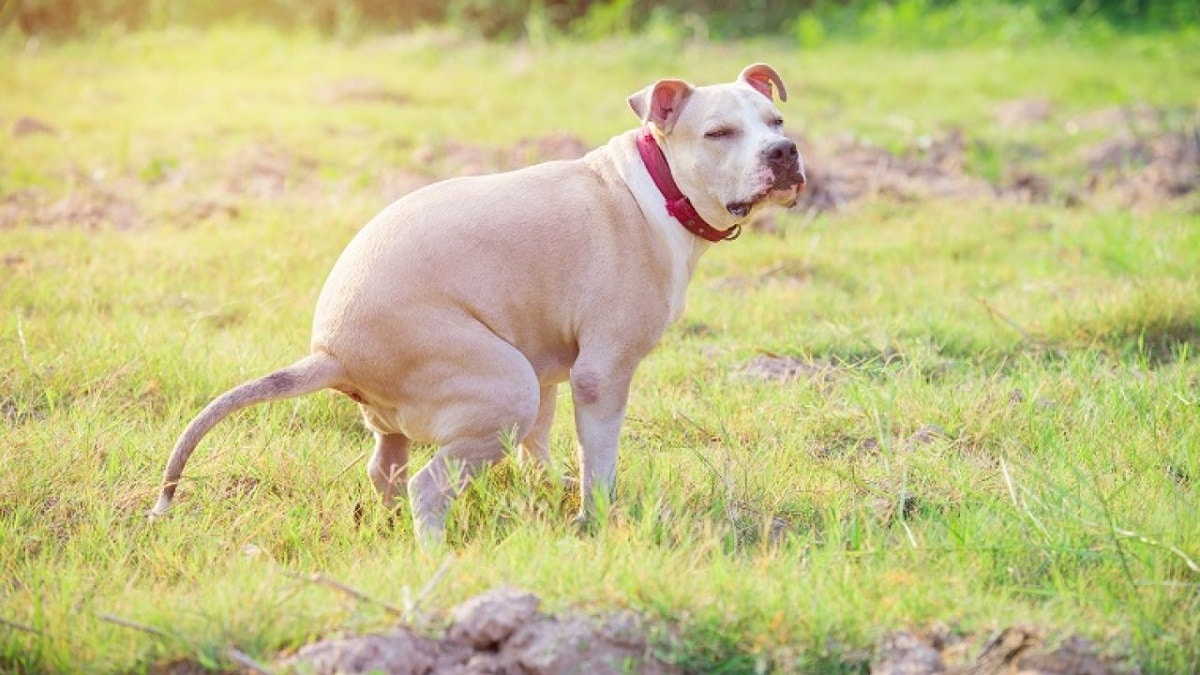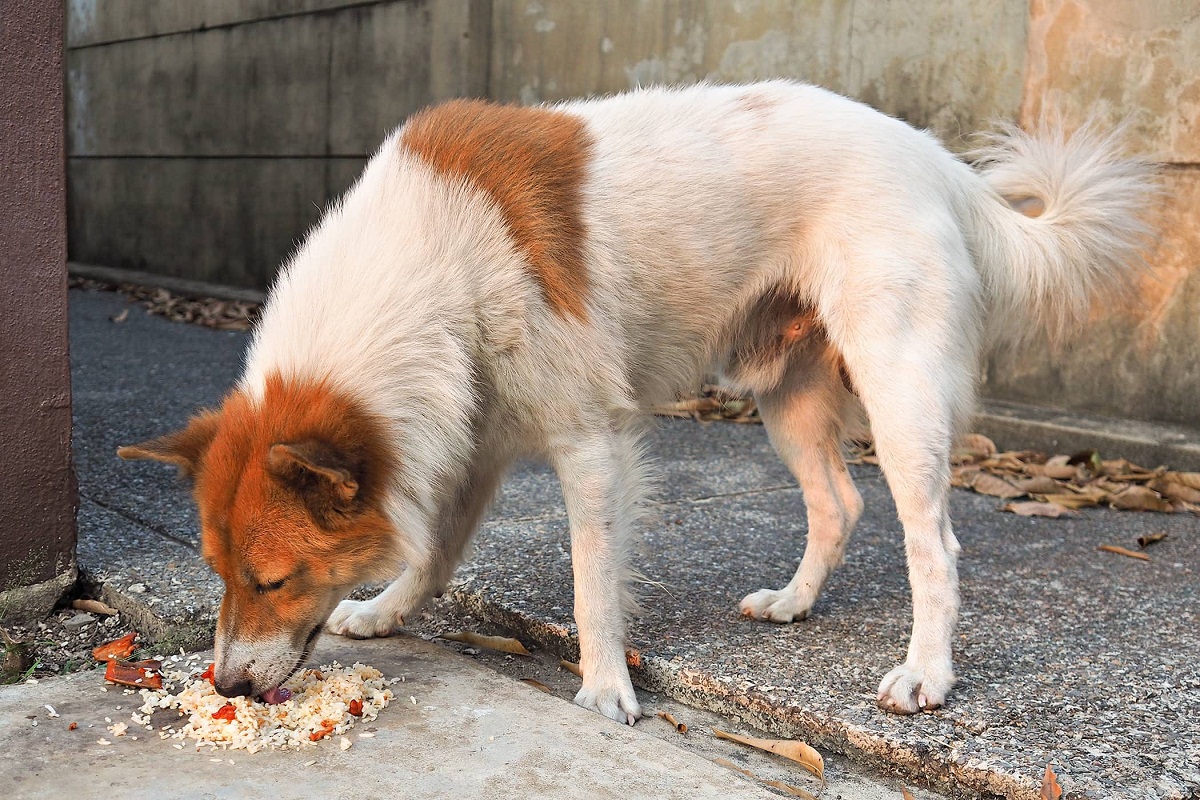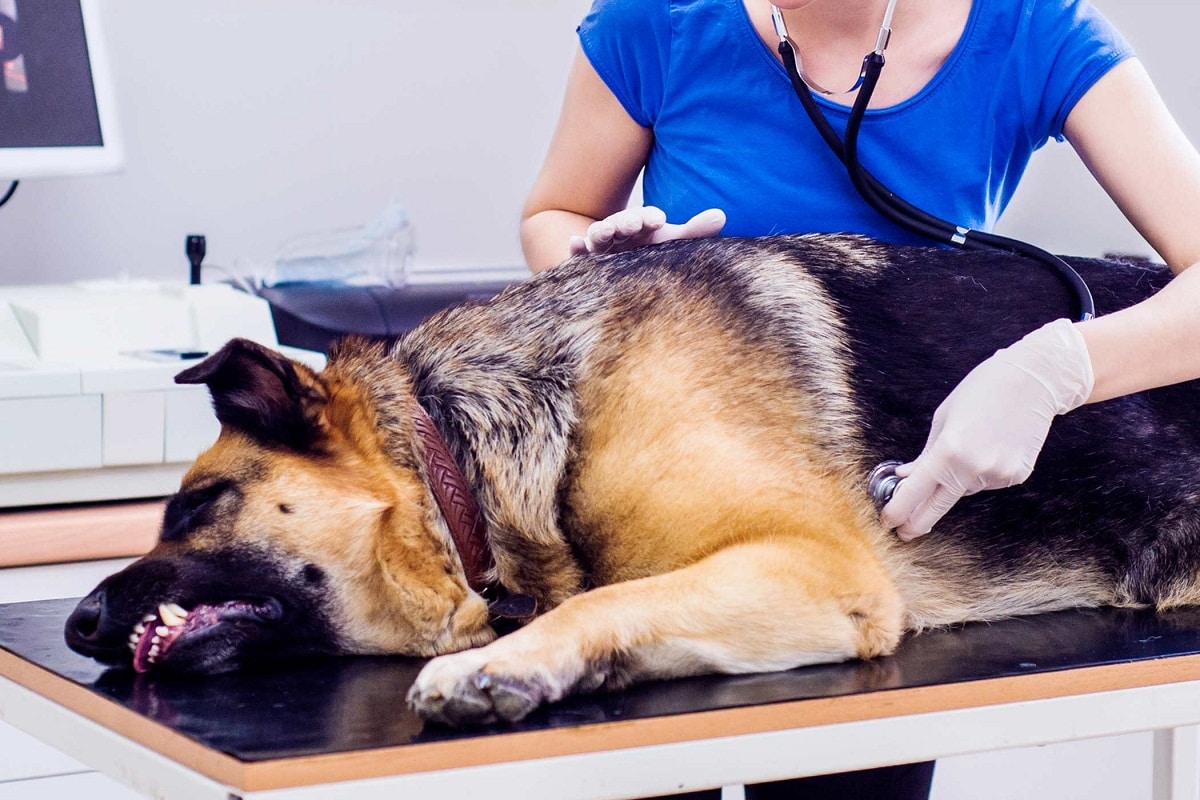
Gastroenteritis is one of the diseases that many animals can have, among which we find humans and also dogs. Although the normal thing is that it does not last more than a few days, during that time we are accompanied by a feeling of discomfort that we want to disappear as soon as possible.
What can we do to help our furry ones? Keep reading and I will explain how to cure gastroenteritis in dogs.
What is it?

La gastroenteritis or gastrointestinal infection is the inflammation of the inner membrane of the gastrointestinal tract, like the small intestine or stomach. It can be acute, persistent or chronic, something that must be taken into account when treating it.
The causes of this disease in dogs are the following:
Drinking contaminated water
When ingested, bacteria and viruses are introduced into the dog's organism that cause abdominal pain, vomiting, and loose stools to be watched carefully.
Bacterial infection
The main causes of gastrointestinal diseases in dogs are Campylob Character Jejuni and Campylob character ypasaliensis,which are manifested by stomach pain and cramp, lethargy, diarrhea and fever.
Viral infection
There are a number of viral diseases that affect dogsAmong them are distemper, parvavirus, coronavirus gastroenteritis, infectious hepatitis, rabies and infectious laryngotracheitis.
In the case of gastroenteritis caused by viruses they are less dangerous in animals, and their mortality level is quite low and because it is viral, the best prevention is vaccination since the canine is a puppy.
Fungal infection
This type of infection is caused by fungi present in the environment, which may only affect the skin and in more severe cases, is the cause of serious systemic diseases.
These are the main fungal infections that can affect the dog:
Blastomycosis
Which is very common in animals that spend most of their time outdoors and they live near water sources, such as lakes, rivers, etc.
Coccidioidomycosis
An infection that can be very deadly and that is typical of dry climates, spreads through spores that enter the body and make the pet sick.
Cryptococcosis
The fungus that produces it is very similar to yeast, present in pigeon droppings.
Prolonged Stress
In normal situations, stress helps the dog stay alert, but when it is prolonged it can generate a series of undesirable behaviors and complications.
One of the consequences is more frequent bowel movements than normal, accompanied by vomiting and diarrhea, all of which will weaken and compromise the health of the faithful friend.
Contact with sick dogs
When the animal that is infected comes into contact with other dogs, this disease is spread, so if your pet has the disease you should keep it away from other pets and if there are several at home, the hygiene measures of the feeders, drinkers, toys and the space where they are must be well taken care of.
Ingestion of toxic plants
The intake of toxic plants generates quite severe intestinal symptoms in canines, such as vomiting, diarrhea that, if not treated immediately, cause death.
Some of these plants are the aloe, flamingo flower, azalea, croton, ornamental plant bulbs and dracena, Among others.
Intake of spoiled food
Maybe during the walk or rummaging through the rubbish of the house, the dog eats some spoiled food whose bacteria, parasites or viruses cause severe diarrhea in it.
Sometimes it is very difficult to know what the cause has been, so to avoid problems what you should do is prevent them from eating garbage and above all, things that can be found on the street. In the event that we want to give them homemade food, it is preferable that it is, at least, cooked.
What are the symptoms?
Dogs can get gastroenteritis at any time in their life, but puppies, the elderly and those with a weakened defense system are more at risk due to illness.
The most common symptoms are:
Loose or watery diarrhea
In this case, quite soft and even liquid stools are evidenced that come out almost are control of our dog, they even leave the adjacent area of the anus dirty and irritated from so many times she has defecated.
Loss of appetite
Our dog will be reluctant when it comes to eating and even drinking fluids, this is a symptom to watch out for as it dehydrates and recovery of health is very difficult.
High rise
Due to the constant stools the dog becomes dehydrated and is very thirsty, But when he drinks water, he immediately makes an effort to vomit.
Apathy
He loses all interest in doing his normal daily activities, such as walking, playing, barking, etc.
Abdominal cramps
You will notice that the dog emits squeaks and whines caused by pain and discomfort in the abdominal area, in addition to unusual movements in your belly.
Fever
If you notice him being lethargic, in no mood for anything and with dry mucous membranes you may be facing a feverish picture, so you should take its temperature.
Dehydration
This is recognized by an abnormal dryness of the mucous membranes and because it is difficult for the skin to return to its normal position.
Nausea with or without vomiting
Immediately after eating or drinking something, He makes movements forcing himself to vomit, although sometimes he does not succeed.
General discomfort
The pet She is going to show down, apathetic, without spiritsHe will not want to eat or drink anything, he will reject the contact, especially if it is in the abdominal area.
Blood in stool or vomit
One of the most alarming symptoms is presence of blood in stools and vomiting, because you may be in the presence of a hemorrhagic gastroenteritis and they must be treated urgently.
Hemorrhagic gastroenteritis in dogs
It is characterized by the presence of blood in stool or vomit. It is very, very serious, since it can cause death if it is not detected and treated in time.
For this reason, they must be taken to the vet urgently to be examined and given the most appropriate treatment so that they can lead a normal life as soon as possible.
How long does it last?
Gastroenteritis that is not too severe (i.e. that is not accompanied by blood) usually last about 2 to 3 days. Of course, we need to know that it can be infected, so we must put on rubber gloves (such as kitchen ones) when we go to remove their stools and clean their personal belongings.
To help them get better, we advise using enzymatic products to clean floors, since bleach or ammonia make them want to urinate more and can cause dizziness.
Which is the treatment?

So that our furry can recover as soon as possible, we must take them to the vet as soon as we detect the symptomsas they may need drug treatment to relieve the sensation of pain or the urge to vomit.
Then once we are at home, the professional will probably recommend that we remove their food for 24 hours. In this way, your stomach will be able to rest and recover little by little.
Of course, we have to make sure that they have clean and fresh water at their free disposal; And not only that, but we also have to encourage them to drink.
From the next day, we will give them a soft diet consisting of boiled rice and chicken (boneless) until we see that they are already better and that they defecate normally again.
Home remedies to help them
In addition to what has been discussed so far, what we can do is give you the following:
Probiotics while fasting
This way your intestinal flora will be balanced. But why probiotics? These contain strains of bacteria which act on the intestinal flora and help to balance and restore it quickly and safely.
Ideally, you should acquire a probiotics that are indicated for the dog and you will see how it helps to mitigate the symptoms, while the intestinal flora recovers its natural defenses.
Chamomile infusion
We can give you small amounts to help ease the pain. This must be supplied little by little so that he can accept it and tolerate it, the action of this is to minimize the inflammation of the digestive walls that cause discomfort in the canine.
Garlic
Garlic supplied in the correct amount can aid in recovery from gastroenteritis, it is always good to consult with the vet, before mincing a garlic clove daily and adding it to the dog's food.
This is recommended for the antibacterial properties of garlic, which will help the digestive system fight against infection.
The pumpkin
This contains a lot of fiber and is ideal to facilitate intestinal transit, often indicated in cases of diarrhea and can be supplied mixed with rice and some cooked chicken. However, there are cases in which the canines are highly sensitive, so you must wait until there is no diarrhea or vomiting to include it in your diet.
Other tips that can help with the treatment of gastroenteritis, which you can apply at home are:
- After 36 hours without improvement of symptoms, take it urgently to the vet.
- If symptoms such as lethargy, fever, weak and erratic movements are added, requires prompt veterinary assistance.
- After fasting, the transition to the traditional diet of the animal You must first go through a soft diet indicated by the specialist.
- Do not use treatments to the dog that are indicated for humans, the reactions, physiology and effects are not the same.
- Use a medicine indicated in the treatment of conditions in the intestine, and of homeopathic origin.
What can be given to a dog with gastritis?

Our dog friends can also get gastritis and the discomfort can be quite unpleasant for him. Some of the causes of this inflammation of the stomach wall are a improper diet, intake of drugs, chemicals or toxic substances.
While taking him to the vet, it is advisable to:
- That he is not loose at will if he has a habit of eating or licking things that can make his symptoms worse.
- If you have diarrhea or vomiting, have a fast of at least 12 hours for the stomach to recover. During this process you should always have access to fresh and clean water to drink, you should even try to get him to drink a little as otherwise he can become dehydrated.
- After fasting, start the diet with cooked rice with boneless chicken and a little banana.
- The vet can also recommend a special low-fat kibble, so that when eating it does not harm him.
- Daily you can supply a small spoonful of natural yogurt Before the meal.
- The amount of daily food must be divided into several portions, so you eat more than once.
- Give him a chamomile tea to drinkas it will help deflate the stomach.
Is gastroenteritis spread to other dogs or animals?
Depending on what has caused the gastroenteritis, it can be transmitted to other dogs or animals, but not to humans. For example, when it is motivated by the intake of rotting food or garbage, it is unlikely to be passed from one dog to another.
When caused by bacteria or viruses, also fungi or bacteria even parasites, the spread of the disease from one dog to another is perfectly possible.
Does it stick from dogs to humans?
Definitely gastroenteritis regardless of whether it is of viral, bacterial, fungal origin among others, it is not contagious to humans.
It is evident that when your dog is diagnosed with gastroenteritis and even if you have suspicions due to the symptoms, you must take the necessary precautions in the use of stools, their utensils as a trough and feederas well as their toys.
The most appropriate thing is that you use gloves like the ones you use in the kitchen, or to do the cleaning at home, especially to manipulate your things And just to prevent bacteria or whatever has caused the disease from contaminating other things.
These measures are also used when you have several dogs or pets sharing the same space, since as we have said, it is spread between animals and especially between dogs. In this sense, With these measures and the preventive isolation of the sick dog, it would be more than enough.
What to do if your dog does not want to eat because of gastroenteritis?
If symptoms just appear, you can let him fast before giving him a bland diet and try to get him to drink water during fasting hours. Food must be offered in small quantities so that the stomach accepts them without problems
What you should not do is let more than two days go by without feeding and with persistent discomforts, in which case the best thing to do is urgently take him to the vet for diagnosis and treatment.
Death from hemorrhagic gastroenteritis in dogs
The presence of blood in the stool and vomiting of the dog is a bad symptom, if the stool is also smelly, the dog may be in the presence of a hemorrhagic gastroenteritis, which if not treated within 24 hours can cause death from hypovolemic shock and collapse.
For this reason it is imperative that when there are these specific symptoms you take him to the consultation with the go, since if it is treated in time, the prognosis is quite good.
The treatment consists of application of isotonic fluids quickly To neutralize hypovolemic shock, it is applied for the first 24 hours and depending on how severe the situation is. This is accompanied by total fasting of solids and liquids.
Bloody stools from gastroenteritis in dogs
When you see fresh blood in dog feces, may be the product, among other things, of hemorrhagic gastroenteritis, This can occur in loose stools and also in diarrhea.
We remind you that before any of the symptoms that we have mentioned of gastroenteritis, the most appropriate thing is that you consult the vet first before applying any measure in the house.

Hello, I need a quick answer. What probiotics should I give you a thousand thanks